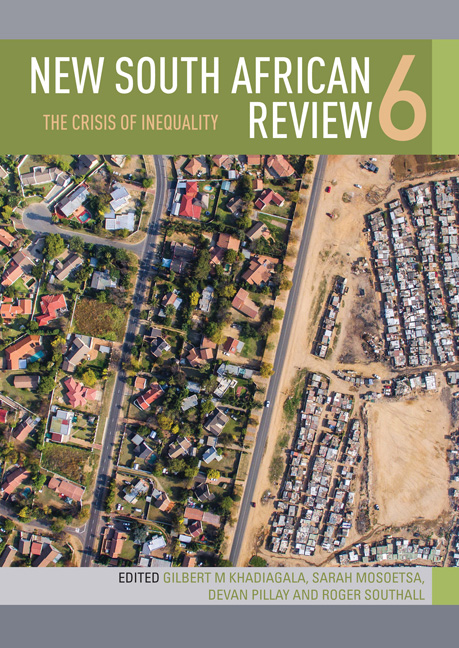Book contents
- Frontmatter
- Contents
- List of tables and figures
- INTRODUCTION: The global crisis of inequality and its South African manifestations
- PART 1 INEQUALITY AND CLASS: POLARITIES AND POLICIES
- PART 2 THE POLITICS OF INEQUALITY
- CHAPTER 5 Liberal democracy, inequality and the imperatives of alternative politics: Nigeria and South Africa
- CHAPTER 6 Liberalism and anti-liberalism in South Africa. Or, is an egalitarian liberalism possible?
- CHAPTER 7 Equality and inequality in South Africa: What do we actually want? And how do we get it?
- PART 3 SOCIAL DIMENSIONS OF INEQUALITY
- PART 4 LAND AND ENVIRONMENT
- Contributors
- Index
CHAPTER 5 - Liberal democracy, inequality and the imperatives of alternative politics: Nigeria and South Africa
from PART 2 - THE POLITICS OF INEQUALITY
Published online by Cambridge University Press: 23 March 2018
- Frontmatter
- Contents
- List of tables and figures
- INTRODUCTION: The global crisis of inequality and its South African manifestations
- PART 1 INEQUALITY AND CLASS: POLARITIES AND POLICIES
- PART 2 THE POLITICS OF INEQUALITY
- CHAPTER 5 Liberal democracy, inequality and the imperatives of alternative politics: Nigeria and South Africa
- CHAPTER 6 Liberalism and anti-liberalism in South Africa. Or, is an egalitarian liberalism possible?
- CHAPTER 7 Equality and inequality in South Africa: What do we actually want? And how do we get it?
- PART 3 SOCIAL DIMENSIONS OF INEQUALITY
- PART 4 LAND AND ENVIRONMENT
- Contributors
- Index
Summary
After many years of despotic and autocratic rule, African countries joined the third wave of democracy in the 1990s (Huntington 1991). The return to democracy on the continent was motivated by various factors, including revolutionary pressures from within in the form of protests, civil disobedience and violent struggles as well as external pressures from development agents which made democracy a primary condition of eligibility for development aid and assistance. Today, however, democratic governance in Africa is highly uneven, involving simultaneity in the pursuit of democratic consolidation, slight improvements over previous elections, cases of opposition political parties winning elections at different levels and development or strengthening critical institutions such as election management bodies and (to some extent) judiciaries. Bright prospects have been blighted by cases of leaders making attempts to change – or successfully changing – constitutions to stay longer in government, as well as intolerance of opposition parties, leading to what Diamond (2002) calls the retreat of democracy.
The variations in the practice of democracy and the forms of democratic governance have given rise to interpretations such as illiberal democracy, authoritarian democracy and hybrid democracy. There have also been serious concerns about the prospects of democracy fostering inclusive development in Africa, concerns borne out in the complexities in explaining the wide gap between the expectations of egalitarianism, inclusiveness and voice to the disadvantaged and the reality that liberal democracy has not been able to bridge such yawning gaps between rich and poor.
The two case studies in this chapter, South Africa and Nigeria, pose some similarities and contrasts in the structure of their economies; the composition of the elite base in society; the nature and character of the state's capacity to deliver on the promises of fostering inclusive development; institutionalisation of the political processes; and the relevance of political parties to policy making. The similarities can be seen in the size of their economies (two of the three biggest in Africa); the adoption of liberal democracy; patrimonialism (the client-patron relationship) in politics; and the nature of the economy. The differences can be seen in the form of colonialism they experienced (South Africa's settler colonialism and Nigeria's non-settler colonialism); the racial composition of South African society and the relatively developed auto-economy of South Africa as against the oil and resource-dependent economy of Nigeria.
- Type
- Chapter
- Information
- New South African Review 6The Crisis of Inequality, pp. 102 - 114Publisher: Wits University PressPrint publication year: 2018

